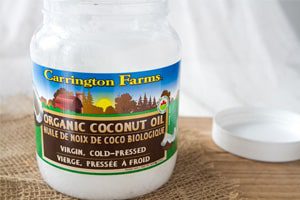
A proposed class action against a company that touts its coconut oil as “healthy,” claims the company misleads consumers into thinking the product is good for them when it is almost entirely made up of saturated fat. A California woman claims that labels on Carrington Tea Co. LLC’s Carrington Farms extra virgin coconut oil and coconut cooking […]
 A proposed class action against a company that touts its coconut oil as “healthy,” claims the company misleads consumers into thinking the product is good for them when it is almost entirely made up of saturated fat.
A proposed class action against a company that touts its coconut oil as “healthy,” claims the company misleads consumers into thinking the product is good for them when it is almost entirely made up of saturated fat.
A California woman claims that labels on Carrington Tea Co. LLC’s Carrington Farms extra virgin coconut oil and coconut cooking oil have deceived consumers since the products came on the market in 2013, Law360 reports. The label includes health claims that violate U.S. Food and Drug Administration (FDA) guidelines and the state’s False Advertising Law, Unfair Competition Law, and Consumer Legal Remedies Act, the lawsuit alleges.
According to the complaint, “Carrington is well aware of consumer preference for healthful foods, and therefore employs, and has employed, a strategic marketing campaign intended to convince consumers that the Carrington Farms coconut oil products are healthy, despite that they are almost entirely composed of unhealthy saturated fat,” Law360 reports.
Carrington markets the coconut oil as better for health than butter or other cooking oils when in fact the opposite is true, the California shopper said. Government agencies recommend replacing coconut and palm oils with oils such as soy and canola, which are lower in saturated fat. The legal complaint says studies have shown coconut oil increases the risk of heart disease and other health issues, according to Law360.
The products contain 14 grams of fat and 12 grams of saturated fat per 14-gram serving but the labels include statements like “described by nutritionists as ‘the healthiest oil on earth’” and “the perfect choice for your health and energy,” according to Law360. The lawsuit alleges that FDA rules prohibit the use of the term “healthy” unless a food meets certain criteria. The coconut label also directly contravenes FDA regulations by making “nutrient content claims” about the levels of trans fat and fatty acids in the product, the complaint alleges.
When a food consumed in small amounts makes such health claims, and yet also contains more than 13 grams of fat or 4 grams of saturated fat per 50-gram serving, the FDA requires the label to point consumers to the fat content on the back panel nutrition information, and these products fail to do so, the California woman claims.
The California woman seeks to represent a class of California residents who bought the coconut oil. She wants the company to recall the products, put out corrective advertising, and return the profits it made on the mislabeled oils.
An attorney who has represented companies facing class actions told Law360 that if the plaintiff argues that coconut oil is a dangerous product, the court will have to delve into the dietary science around that claim. The attorney asked if “a jury of six or 12 people going to determine for the rest of the scientific community whether this fat is unhealthy? That is the danger of allowing suits of this nature to go to a jury,” he said.


